DAVE'S DIARY - 14 DECEMBER 2006 - STEVE YOUNG INTERVIEW
STEVE YOUNG AUSTRALIAN TOUR #5
Steve Young
is making his fifth Australian tour in January, 2007, to promote his 13th
album Songlines Revisited Volume 1.
The album - a reworking of his classic songs - was released in May 2005
on the indie Starry Pyramid label.
Steve's son
Jubal Lee Young - also a musician and songwriter with solo albums, played
on his dad's 1993 CD Switchblades of Love and sang harmony on Songlines
Revisited.
Nu Country FM disc jockeys Colin Weidner and Nipper Mack filmed and interviewed
Steve at Tommy Alverson's family gathering in Texas in 2005.
It will appear on Nu Country TV on January 13, 2007.
Here is a Steve interview by David Dawson on the eve of his fourth Australian
tour in 1999.
STEVE YOUNG INTERVIEW 1999
CALIFORNIA DREAMING FOR YOUNG STEVE
"Going back to California, at last I will be gone/ going back to California to see what she's got on/ 'cause I remember a kid from Dixie in 1963/ you know she took him in her arms/ and showed off her charms/ to that little Alabama refugee." - Steve Young
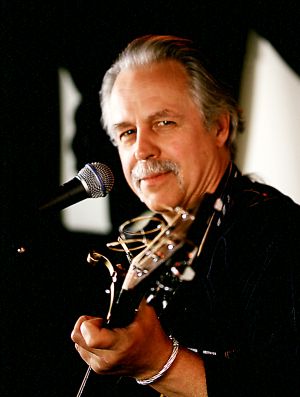 |
Georgian
born troubadour Steve Young first recorded singles in Texas in 1959
as a teenager with knockabout Cowboy Jack Clement - a latter day Johnny
Cash sidekick, writer and rebel-rouser. Now, 32 years down the lost highway, Steve returned to Encino, California, for 12th album Primal Young that won worldwide release on the indie roots label - Melbourne based Shock Records. |
For Steve the project was his first return to the studio since 1993 disc,
Switchblades Of Love, released by financially challenged Austin
based label Watermelon and distributed by Shock.
Young, now 64, performed in Australia at the Continental Café in
Prahran, to promote the J. C. Crowley produced 11 track album - an eclectic
mix of originals and revamps of Tom T Hall classic The Year Clayton Delaney
Died, Lloyd Price rock relic Lawdy Miss Clawdy and Frankie Miller rural
anthem Blackland Farmer.
Young put his stamp on Sometimes I Dream - penned by Californian
legend Merle Haggard and fifth wife Theresa.
Ruptured romance is also a fertile font for the singer's original tunes
Heartbreak Girl and No Longer Will My Heart Be Truly Breaking.
The album closes with Little Birdie - a tune showcased on a previous
Australian tour.
His session musicians include pianist Van Dyke Parks, drummer Andy Kamman,
pedal steel player Van Monnet and son Jubal Lee Young on harmony.
Although Steve's fame came from New South outlaws Waylon Jennings and
Hank Williams Jr it's the old south he has reactivated on his album sleeve
and musical repertoire.
The singer, born in the same Georgian town of Newnan as superstar Alan
Jackson, uses an historic picture of his bucolic grandfather Milton Arlin
Horsley and family outside their fruit and vegetable produce store in
Carrolton, Georgia.
Every good picture is worth a thousand words - the value of this one is
multiplied in conjunction with the thematic joy of tunes such as Steve's
original East Virginia, Worker's Song, Scotland Is A Land, Jig and
Blackland Farmer.
THE EAGLES
Young has
returned to the geographical and historical landscape that spawned his
biggest earner - the oft-covered Eagles hit Seven Bridges Road
- and kept the dingo from his door in his darkest days.
Those days ended in 1979 when Young quit drinking and drugging and adopted
Buddhism, alternate diet and the wisdom of a road survivor.
Young has long been hip, well before my first interview with him in Nashville
in 1978, and he does it without the pretence of peers pirouetting for
the pseudo glare of the day.
"I'm a contrary guy in a way," Young revealed on the eve of
his tour, "I kind of wish I weren't this way. I often envy people
that go out and do things the way they're supposed to be done and make
it all work. But anytime there's a lot of hype around something, or there's
an exclusive group of people who claim to be hip, I get turned off by
it. It happens to every movement. It happened to the Beat movement, it
happened to the hippie movement. They all go downhill pretty quickly."
Although Young, now living in a Latino neighbourhood of East Los Angeles,
is an idyllic island in the country mainstream he is at peace with the
world.
His songs have been cut by many major stars but the fame flood has never
washed him overboard into the tidal wave of trivial travails that claim
so many "overnight superstars" as they become prisoners of their
manufactured image.
"There's something about my karma," says Young who once offered
to do a gig at Snake Gully hall near Ballarat en route from Warrnambool
to his proclaimed venue, the Camp Hotel in Premier Bracks home town.
"I'm always way in the background and it may just be something I
unconsciously create or help to create. I'm doing my thing and I'm true
to that. That's all that I know how to do.
I've never set out to do a hit or even be successful. I'm setting out
to be true to myself, I often think I'm actually missing a gene because
I don't have that drive to just do something that sells."
Instead the diminutive dynamo channels his creative charm into a rich
life that remains high in the saddle of history.
Young's career started when he moved to Beaumont, Texas, as a teenager
with his mother after his parents separated.
COWBOY JACK CLEMENT
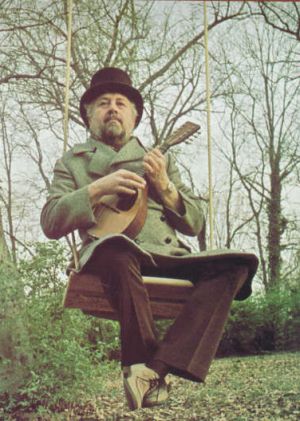 Cowboy Jack Clements |
Cowboy
Jack produced Young's debut disc on his indie label Timberline in
Beaumont, Texas. Young made a brief Greenwich Village invasion, returned to Dixie and then headed to California. Young wrote two songs for an album by his band Stone Country in 1967 before his solo disc Rock, Salt & Nails with the late Gram Parsons on organ and fellow Byrds Gene Clark (harmonica), Chris Hillman, Bernie Leadon and James Burton. It was the birth of country rock, known as progressive country here and redneck rock in Texas. "Gram was just finishing up Gilded Palace Of Sin," Steve recalled. "Dillard & Clark had done a record and there was mine. We foreshadowed the whole country rock thing. I was part of that. Gram was very interested in my music and offered a lot of support." |
Steve shared
a an offstage career as a postie with John Prine and cut his second album
Seven Bridges Road before running a San Francisco guitar shop and
heading south to Nashville.
Seven Bridges Road, a huge earner cut by The Eagles, Joan Baez,
Rita Coolidge, Iain Matthews, Eddy Arnold, Firehouse, Texan band Ricochet
and recently Dolly Parton, almost didn't surface.
Producer Tommy LiPuma wanted Young to cut folk and country covers instead
of original material.
"One day we ran out of songs to record in the studio," Young
recalled.
"James Burton and the bass player were there and everything was up
and rolling so I started performing Seven Bridges Road because
I didn't have anything else to play. I didn't even know if the song was
in its final form yet. James said to LiPuma 'well, this song is ready
- why don't just put it on tape.' And that's how the song first got recorded.
After it was recorded LiPuma had to admit that, original or not, it was
good."
The song was inspired by a road in rural Alabama named Woodley Road but
referred to for a century by locals as Seven Bridges Road.
WAYLON JENNINGS
"It
went out to this beautiful pastoral countryside, and as you crossed over
seven bridges, there were high banked dirt roads and old cemeteries and
old oak trees with Spanish moss hanging from them," Young recalled.
| Young
fronted Nashville in 1972 - the year Waylon Jennings chose his Lonesome,
Ornery And Mean as title track of his album and made a pungent
prophecy. "Steve Young will be the Bob Dylan of country music but he's not country, not pop, not folk," Waylon wailed, "he has no earthly idea of how great he is. I believe in that dude." That was reflected in the title track of Young's 1976 disc Renegade Picker - the album between Honky Tonk Man (1975) and No Place To Fall (1978). |
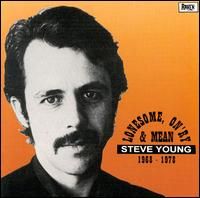 |
"I'm
a renegade picker, partly hippie and partly kicker/ been around, been
around/ I may never settle down," Young sang as he joined the outlaw
movement in music and lifestyle.
When I interviewed Steve in 1978 he was soon to quit two decades of living
on the edge.
"The lowest point of my life was my last active drinking days in
1979," Steve later revealed, "I was about to die. I was probably
mentally depressed and had no hope. Once I had faced up to that and admitted
I had a problem it's amazing how quickly things changed. I began to find
a sense of hope."
The singer suffered a painful divorce but was rescued when he found Buddhism
(his E-mail address is BUDAYOUNG@AOL.COM) and became a vegetarian with
a strict exercise regime.
It enabled him to produce a prolific writing tableau inspired by his widespread
travels from homes in Austin, Nashville and Los Angeles and tours of Europe,
Asia, The Pacific and Australasia.
More albums followed - To Satisfy You (1982), Look Homeward
Angel (1986) and Long Time Rider (1987) - in the leaner years.
But his career was reborn with Solo Live (1991), Switchblades
Of Love (1993) and Primal Young in 1999.
There was also the acclaimed Glenn Baker Raven compilation Lonesome,
Ornery & Mean (1968-78) and latter day praise by Steve Earle,
Lucinda Williams and the late Townes Van Zandt.
HANK AND TOWNES
"As
a writer Steve is in a league with Dylan and Hank Williams and he sings
like an angel," says Lucinda of Young whose other protégé
Van Zandt died on the same day as Hank but 44 years later at the age of
52.
Young, born in Newnan and raised in Alabama, almost died twice in his
ascent to creative longevity.
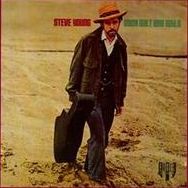 |
At
17 a steel jacketed bullet from a bandit's .32 Baretta tore through
his chest and severed an artery behind his heart in the Texas town
of Port Arthur. Young survived the failed robbery attempt near a bayside bordello but fought a pitched battle with the booze and dope demons that claimed mentor Hank Williams at 29 on New Years Day 1953. Ironically, Steve and Jackson, 48, also honored their hero Hank two decades apart with sibling tunes Montgomery In The Rain and Midnight In Montgomery. |
Steve's
song, originally on his 1971 album Seven Bridges Road, was covered
by Hank Williams Jr on his 1977 disc The New South which also contained
Young tune Long Way To Hollywood.
Midnight In Montgomery, co-written by Alan with Don Sampson, was
a highlight of Jackson's 1991 disc Don't Rock The Jukebox.
The themes share similar roots, but as John Hiatt says, "if it ain't
nailed down, you can steal it."
| Young,
a prolific writer making his fourth Australian tour, is a little more
diplomatic. "I have no legal right but whoever wrote that song must have listened to Montgomery In The Rain," says Steve, "a lot of that goes on in Nashville - there are a certain amount of things to steal that are legal, so to speak. They walk a thin line." With such a deep catalogue Young is not losing any sleep over writing proteges - his career started when he moved to Beaumont, Texas, as a teenager with his mother after his parents separated. |
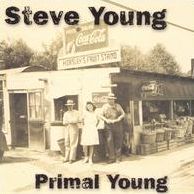 |
Famed producer Cowboy Jack Clement produced Young's debut singles on his indie label Timberline in Beaumont but it wasn't until Steve headed to California that his music received wider exposure.
STEVE YOUNG DISCOGRAPHY
Songlines
Revisited, Vol. One (Starry Pyramid) - 2005
Renegade Picker/No Place to Fall - double CD, re-issue (BMG import, U.K.)
2000
Primal Young (Shock, Australia /Appleseed, U.S.) 1999
Honky Tonk Man (re-issue, Drive) 1995
Lonesome, On'ry & Mean: Steve Young (Raven, Aus.) 1994
Switchblades of Love ((Watermelon, U.S.; / Dixie Frog, Eur.) 1993
Steve Young - Solo / Live (Watermelon, U.S. / Demon, Eur.) 1991
Long Time Rider (Voodoo, Eur.) 1991
Long Time Rider (Golden Chain) 1987
Rock, Salt and Nails (Demon, U.K.) 1986
To Satisfy You (Rounder) 1982
Seven Bridges Road, re-issue (Rounder) 1981
Old Memories (Country Roads, U.K.) 1980
No Place to Fall (RCA) 1978
Renegade Picker (RCA) 1976
Honky Tonk Man (Mountain Railroad) 1975
Seven Bridges Road, re-issue (Blue Canyon) 1973
Seven Bridges Road (Reprise) 1971
Rock, Salt and Nails (A & M) 1969